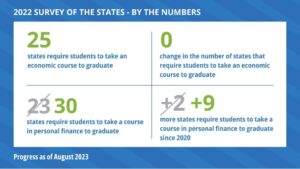
Give Your Children the Gift of Financial Literacy

As a parent, you are well aware of your responsibility in helping your children grow up happy and healthy. Once they enter their teen years, the pressure can build to impart more of your wisdom. One area you shouldn’t overlook is how to handle money.
Helping your children develop basic financial skills is critical to preparing them for the decisions they may eventually make as they age. Laying a solid foundation in their formative years can help shape their lasting relationship with money.
Money habits may not be taught in schools.
If you think they will learn all they need to know in school, that may not be the case. Although more states are realizing the importance of teaching students about money, as of the end of 2023, only 30 states require a course in personal finance to graduate.1

The Council for Economic Education, February 20241
As parents, you are one of the most significant influences on money habits, and your children will see you practicing financial concepts in real-life situations. Yet one study shows that only 28 percent of parents speak to their children about money. Think of school as a reinforcement of the concepts you may have already started discussing.2
How old should kids be when they start learning about money?
Warren Buffett once said parents’ biggest mistake when teaching children about money is waiting too long to start. One study from the University of Cambridge found that kids can already grasp basic money concepts between 3 and 4. By age 7, basic concepts relating to future financial behaviors have typically started to develop.3,4
Starting early can help, but so is keeping the ongoing financial education age appropriate. Between the ages of 11 and 13, children may be ready to learn about the benefits and drawbacks of credit and debt, as well as interest, budgeting, and identity theft. Older teens will be able to grasp the concepts of long-term investing, good versus bad debt, and taxes.5
Based on your child’s age, there are many ways to introduce financial literacy concepts in a comfortable, easy-to-grasp, and non-threatening way. Once they have a basic understanding, you may be able to take actionable steps to teach them more advanced lessons about money.
Money basics for younger children
Here are some ideas for helping to create a baseline of financial knowledge for your younger children:
• Involve children in family conversations about budgeting, saving, and careful spending. Hearing you problem-solve can equip them to handle issues better when they’re older.
• Consider giving your children an age-appropriate allowance tied to predetermined household chores to help teach them the value of money, what goes into earning it, and how to begin balancing their savings and spending.
• Make learning a game by using iconic board games like Monopoly and Life. You may be surprised at how much these old-school games teach skills such as investing, saving, and preparation. There are also online games that teach similar lessons.
• Let your children witness actual cash transactions, as it may help teach kids the value of different denominations of bills and coins and the importance of seeing how much money is needed for what they want to buy.

Money lessons and actions for teens
When your children enter their teen years, they should start to show a basic understanding of personal finance. This is the time when they may be getting part-time jobs, thinking about major purchases like a car, and preparing to go away to college.
Lessons from getting a job:
• There are reasons for teens to get jobs beyond money. Work teaches responsibility, builds character, encourages teamwork, and gives teens a sense of what they might want to do for a career.
• Earning money from work can be a more powerful concept than allowances, reinforcing how time, labor, and experience matter. They might think twice about spending money they worked hard to earn.

Teaching the difference between needs and wants:
• Deferred gratification can be an essential lesson for impulsive teenagers. Your teen may believe they need the latest smartphone or video game.
• While your teen may have some good reasons to call something a need, stay firm when you talk to them.
• For example, they may need a cell phone but want the latest and greatest.
• If they have money left over after caring for their needs, consider letting them splurge on some wants. This might help reinforce budgeting and debt management in the future.
Asking them to track expenses and start a budget:
• Your teen might learn valuable insights by tracking their spending and setting up a simple budget. Some may be surprised to see where their money goes.
• There are apps designed to help your teen track expenses.
• Once they understand how much they spend, your teen can create a simple budget, perhaps using a money management app.

Understanding Venmo:6
• If you do not have Venmo, consider opening an account and learning how the app works. Then teach your teen (or maybe they’ll teach you!)
• Venmo and other apps are how finances are often handled in this digital age, such as dividing the bill at a restaurant or splitting a rideshare.
• In 2023, Venmo introduced the Venmo Teen Account, allowing parents to open a Venmo account for their teenagers between the ages of 13 and 17 so they can send and receive money.
• Each Venmo Teen Account is connected to and managed by a parent’s personal Venmo account, so the parents can monitor transactions, manage privacy settings, and send money to their teen.
• Venmo is owned by PayPal.6

Consider a Roth IRA to help your teen learn about saving and investing:
• If your teen has earned income, they may be able to qualify for a Roth IRA. The contribution limit to a Roth is a maximum of $7,000 in 2024 and cannot exceed their earnings.
• Suppose you are a small business owner looking for ways to provide additional benefits for your children who work for the company. In that case, you can include a Roth IRA as part of their compensation, a strategy that can potentially benefit both the children and the business.
• Roth IRA contributions are phased out for taxpayers with adjusted gross incomes above a certain amount. To qualify for the tax-free and penalty-free withdrawal of earnings, Roth IRA distributions must meet a 5-year holding requirement and occur after age 59½. Tax-free and penalty-free withdrawals can also be taken under certain circumstances, such as the owner’s death. The original Roth IRA owner is not required to take minimum annual withdrawals.

The gift that keeps on giving
Parents who actively teach their children about money can help them build a foundation for future success. Children’s money habits often begin to form early, and they watch how you handle your finances. By prioritizing teaching financial skills to your teenagers, you may contribute to their academic achievements, career success, and overall well-being. By helping lay a solid foundation, you are helping your child prepare for life’s inevitable financial challenges. If you haven’t already, start now. They might thank you later.
As financial professionals, we are here to help. Please contact us if you have questions on anything covered above.
1. CouncilForEconEd.org, August 2023
https://www.councilforeconed.org/survey-of-the-states-progress-report/
2. BEAU.org, 2024. (Based on a 2019 study that surveyed 1,000 credit union customers.)
https://www.becu.org/-/media/Files/PDF/BECU_Finance_and_Parents_Survey_External_Deck_FINAL.pdf?la=en&rev=1a99f03bce3444919acf0a5847585225&hash=E9B8AC839B5EE38BBC0D2EF046F65C12
3. CNBC.com, July 9, 2020. Updated 2024.
https://www.cnbc.com/2019/07/30/warren-buffett-this-is-the-no-1-mistake-parents-make-when-teaching-kids-about-money.html
4. University of Cambridge, 2024. (The landmark study was first conducted in 2013.)
https://mascdn.azureedge.net/cms/the-money-advice-service-habit-formation-and-learning-in-young-children-may2013.pdf
5. AmericanExpress.com, February 1, 2022
https://www.americanexpress.com/en-us/credit-cards/credit-intel/teaching-kids-about-money/#:~:text=Age-Appropriate%20Financial%20Education%20for%20Kids%201%203%20to,of%20smaller%20purchases%20along%20the%20way.%20More%20items
6. Newsroom.paypal-corp.com, May 22, 2023. Any companies mentioned are for illustrative purposes only. It should not be considered a solicitation for the purchase or sale of the securities. Any investment should be consistent with your objectives, timeframe, and risk tolerance.
https://newsroom.paypal-corp.com/2023-05-22-Introducing-the-Venmo-Teen-Account
 Secure Document Sharing
Secure Document Sharing


